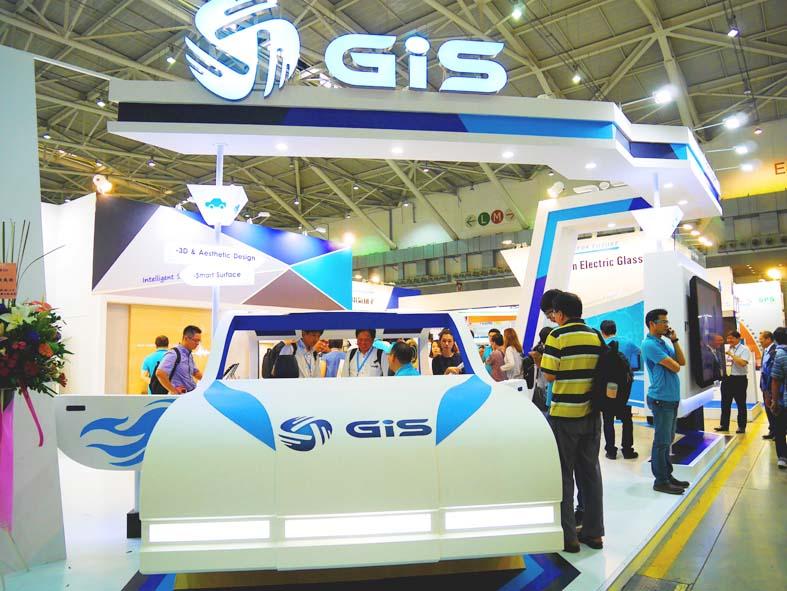GIS Holding Ltd (業成), which supplies touch modules for Apple Inc’s iPads and MacBooks, yesterday said its net profit last year grew 10 percent annually, benefiting from increased demand for notebook computers and tablets as the stay-at-home trend persisted due to the COVID-19 pandemic.
Net profit rose to NT$3.73 billion (US$131.79 million), compared with NT$3.39 billion in 2019, the company said in a filing with the Taiwan Stock Exchange.
It was the fourth consecutive year that the company’s annual profit surpassed its share capital of NT$3.39 billion.

Photo: Chen Mei-ying, Taipei Times
Earnings per share rose to NT$11.04 last year from NT$10.02 the prior year. Gross margin dropped to 8.62 percent last year from 8.86 percent in 2019, the company said.
GIS is 24 percent owned by iPhone assembler Hon Hai Precision Industry Co (鴻海精密).
The Miaoli-based company has aimed to increase shipments of higher-definition touch modules equipped with mini-LED backlights for tablets and OLED touch modules for smartphones.
Revenue grew 6.16 percent to NT$127.1 billion last year from NT$119.72 billion in 2019.
Yuanta Securities Investment Consulting Co (元大投顧) said GIS has benefited from pandemic-driven demand for notebook computers and tablets with touch modules, with a revenue contribution of 75 to 80 percent.
GIS received extra orders from Apple, but lower orders from Chinese touch module supplier O-film Tech Co (歐菲光) due to trade frictions between the US and China, the investment consultant said in a report.
GIS in a separate filing said its board of directors has approved a plan to distribute a cash dividend of NT$4 per common share, representing a dividend yield of 3.4 percent based on the stock’s closing price of NT$114.5 yesterday.
The plan is subject to shareholder approval at an annual general meeting set for May 28.
GIS also plans to invest NT$3.4 billion to expand production capacity at a Chinese touch module factory in Chengdu, Sichuan Province, it said yesterday.
The company’s revenue grew 9.75 percent annually to NT$6.39 billion last month from NT$5.83 billion.
That represented a monthly decline of 21 percent from NT$8.11 billion in January, due to fewer working days.
Revenue in the first two months of this year rose 10.53 percent to NT$14.5 billion, compared with NT$13.12 billion in the same period last year.

‘SWASTICAR’: Tesla CEO Elon Musk’s close association with Donald Trump has prompted opponents to brand him a ‘Nazi’ and resulted in a dramatic drop in sales Demonstrators descended on Tesla Inc dealerships across the US, and in Europe and Canada on Saturday to protest company chief Elon Musk, who has amassed extraordinary power as a top adviser to US President Donald Trump. Waving signs with messages such as “Musk is stealing our money” and “Reclaim our country,” the protests largely took place peacefully following fiery episodes of vandalism on Tesla vehicles, dealerships and other facilities in recent weeks that US officials have denounced as terrorism. Hundreds rallied on Saturday outside the Tesla dealership in Manhattan. Some blasted Musk, the world’s richest man, while others demanded the shuttering of his

ADVERSARIES: The new list includes 11 entities in China and one in Taiwan, which is a local branch of Chinese cloud computing firm Inspur Group The US added dozens of entities to a trade blacklist on Tuesday, the US Department of Commerce said, in part to disrupt Beijing’s artificial intelligence (AI) and advanced computing capabilities. The action affects 80 entities from countries including China, the United Arab Emirates and Iran, with the commerce department citing their “activities contrary to US national security and foreign policy.” Those added to the “entity list” are restricted from obtaining US items and technologies without government authorization. “We will not allow adversaries to exploit American technology to bolster their own militaries and threaten American lives,” US Secretary of Commerce Howard Lutnick said. The entities

Minister of Finance Chuang Tsui-yun (莊翠雲) yesterday told lawmakers that she “would not speculate,” but a “response plan” has been prepared in case Taiwan is targeted by US President Donald Trump’s reciprocal tariffs, which are to be announced on Wednesday next week. The Trump administration, including US Secretary of the Treasury Scott Bessent, has said that much of the proposed reciprocal tariffs would focus on the 15 countries that have the highest trade surpluses with the US. Bessent has referred to those countries as the “dirty 15,” but has not named them. Last year, Taiwan’s US$73.9 billion trade surplus with the US

Prices of gasoline and diesel products at domestic gas stations are to fall NT$0.2 and NT$0.1 per liter respectively this week, even though international crude oil prices rose last week, CPC Corp, Taiwan (台灣中油) and Formosa Petrochemical Corp (台塑石化) said yesterday. International crude oil prices continued rising last week, as the US Energy Information Administration reported a larger-than-expected drop in US commercial crude oil inventories, CPC said in a statement. Based on the company’s floating oil price formula, the cost of crude oil rose 2.38 percent last week from a week earlier, it said. News that US President Donald Trump plans a “secondary